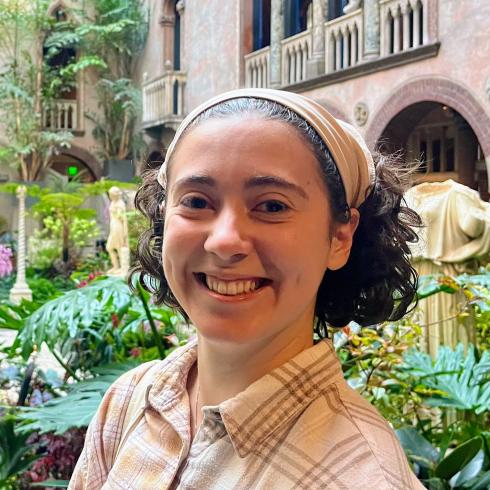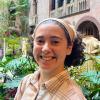I’ve been fortunate enough to have traveled a lot in my life and I’ve loved it. My grandparents immigrated from Italy, so I’ve gotten to experience a very personal and deep connection with them while visiting and also learn about Italy’s history and culture. Traveling is a formative experience for me where I can explore creatively and intellectually. It’s hard to think about standing in the same spot that people stood hundreds of years ago and imagine the possibilities of their lives. But I love having those conversations with friends and family, thinking about time, culture, and history. With this in mind, I knew I wanted to study abroad to be a part of my academic journey.
Two and a half years ago, I went to Italy for the first time in years and I reconnected with a cousin of mine. I had not seen her since I was four and we were around the same age, so she invited me to a carnival with her friends. I had just landed earlier that day so I was completely jet-lagged and exhausted but we ended up staying at the carnival until 2 A.M. and it is one of my favorite memories from that trip. Despite the language barrier, we were able to communicate very well and we ended up talking about something I did not expect, queerness and the LGBTQ+ community. We explained the experience of homophobia in both Italy and the US.. and how they differed. She believes that we should assume bisexuality or pansexuality at birth, leaving all paths open for everyone, and I was like 'yes'! Why should heterosexuality be the assumption and norm? It ended up becoming my mindset for the rest of the trip and I imagined queerness everywhere.
While visiting Pompeii, the museum mentioned homoerotic art and sculptures and recently it was discovered that some human remains from Pompeii were not actually a family with a mother, father, and two kids, but four men in an embrace; on a tour, they mentioned that there were some all-female temples and my immediate reaction was to imagine the lesbian relationships that could have occurred there. It may be unrealistic but the mind has no limits and thinking about the possibilities of history enriched my entire experience.
In the U.S., history is often ignored, suppressed, and taught to be set in stone. We have not truly reconciled with our past, especially slavery and colonialism, and queer history is currently being actively suppressed. Especially right now, it’s beyond frustrating, not only as a queer person, but simply as a human being. As a Women’s, Gender, and Sexuality Studies major, many of my classes look to the past and historical documents to understand how we’ve arrived at this current sociopolitical climate. For anyone who is frustrated, and not just those studying abroad, I encourage you to dig deeper into our history, and while it will probably make it you angry and even more frustrated, it may also provide some hope.
Hope is what I found while taking my freshmen writing seminar class, titled Sex in Advertising. For our final research paper, we could choose our topic and I ended up looking at how Amsterdam has advertised itself as the “gap capital of the world.” I dove into the queer history of Amsterdam and how the city continues to honor and celebrate that history. It immediately went on my bucket list of places I wanted to travel to and thus, it was the first city I looked into when deciding where to study abroad. I learned about how the Netherlands has begun to reconcile with its colonial history. There is still a lot to be done but it’s a start and definitely more than the U.S. has ever done. It was refreshing to see history being acknowledged and actions being taken to reconcile the events and their lasting impacts. At the end of the day, I knew I wanted to study abroad in Amsterdam.
With the help of my home university, I started searching for programs in Amsterdam and the IES Abroad program immediately stood out to me. They offer several courses about psychology and have a class about the Study of Sexuality and Gender in the Context of Amsterdam, which I’m planning to take in the spring! Their partnership with the VU also enables me to take some classes there including Cognition and Emotion and Beyond Gender Inequalities, which has students working directly with the community in Amsterdam. My area of academic interest is where queer studies challenges psychological notions so I’m beyond excited to learn about psychology from a perspective outside of the U.S. and in a place that actively embraces their queer history.
Throughout the entire process, IES Abroad has been incredibly helpful. They’ve provided us with guidance on how to choose classes and many mental health resources. I'm so grateful for the help that they’ve provided and really glad I chose their program.
In no way was that an all encompassing story, but that’s how I ended up choosing Amsterdam. Studying abroad is not an easy decision to make. This will be the first time I’ll be traveling out of the country by myself and I would be lying if I said I was not a little scared. I’m stressed about what I should pack, if I’m packing enough or too much. It’s almost unthinkable to me about how I’m going to spend four months not talking to and see my friends and family everyday. I know there will definitely be challenging days but in the end, it will all be worth it for the experience and what I will learn.
I guess, what I’m trying to say and if this is the only paragraph you read of this, please remember this on your study abroad journey: do everything with purpose and be a little selfish. When choosing a place to study abroad, find a place where you can feel at home and where you can explore everything. Take this opportunity to think about what you want rather than what other people are telling you to do. Step into this journey with purpose and take the time to go where is right for you.

Sophia Lombardi
My name is Sophia Lombardi (she/they) and I’m a student at Brandeis University, studying Psychology, Women’s, Gender, and Sexualities studies, and English. I’m a queer girl who loves soccer/futbol, dancing, choreographing, reading, and writing!







